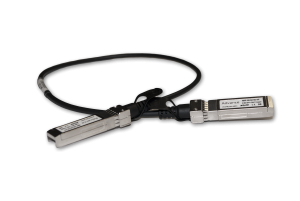
There is a common argument that rolls on between the supporters of third party components and those that prefer to only use vendor branded components; warranty. There is no disagreement that compatible products, such as Advance brand optical modules more often than not have a better warranty out of the box – we offer a lifetime warranty and next day advance replacement as standard which is unrivalled in our industry.
With Advance there is no need to buy separate “smart” support services, “care” packs or other similar, costly add-on services for your already expensive purchase. No, the argument centres around the warranty of the host device, such as the switch or router, and whether it’s warranty is valid when using non-vendor branded components.
It’s surprising to see many suppliers incorrectly advise their customers that using third party components will void their warranty, and forcing them down the route of expensive vendor branded products. Especially surprising when you consider the manufacturers of the products they sell, publicly advertise their stance on third party products, and it’s not all bad news!
I’ll give a general overview of the industry stance, a consensus of sorts between the various vendors, and I’ll provide some sources afterwards for your own research and assurance. To be clear the following information is only applicable to third party hardware components, and more specifically optical modules and attach cables. Vendors may have a different stance on third party software, support and repair services and any other service or product supplied by other sources, and you would need to consult their documentation to verify this.
So the recurring theme from vendors is that yes, they do “allow” users to install third party components into their products. The caveat comes to support, and the stance is that if a fault occurs that is a direct cause of the third party component then they reserve the right to refuse or charge for support. If a fault occurs and it is not attributable to the use of a third party component then support and service will be delivered as expected.

Lets break this down to put things into perspective. We are talking about optical modules and direct attach cables. These are all passive components – that p word is quite important when considering risk vs cost, as it essentially means the component does not introduce a voltage into the system.
In fact it draws a voltage from the system, so there is no risk of the component causing an over-voltage event, which is a common reason why network components become damaged – this is why data cabinets are protected by UPS (uninterruptible power supply) systems and PCs are plugged into surge protected outlets. Realistically there is a chance that the module itself could become damaged due to an over-voltage from the host device, but the suppliers fail to mention that when they tell you not to buy third party products!
So what happens if there is a network failure and it is directly caused by a third party component, such as a failed SFP module? Of course it is not realistic to ask the host device vendor to give you guidance on replacing the module or even supply you with a replacement product. That is why it is important to ensure the third party component itself has a suitable warranty – I’ve said it once, but I’ll mention it again; Advance offer a lifetime warranty on our modules and attach cables, with next day advance replacement as standard. This warranty is actually better than the vast majority of vendors, even if you do use their own modules – most only offer 90 days or at best 1 year warranty, and even then it is return to base, which means it could take 2 weeks or more to get a working replacement!
Hopefully this article has made it clearer and you appreciate the stance from both the vendors and Advance regarding the use of compatible modules and components. You can always contact us to discuss further and see how much you could be saving. And as promised, some source materials for your review:
Cisco: http://www.cisco.com/c/en/us/products/prod_warranty09186a00800b5594.html
Quote: “When a product fault or defect occurs in the network, and Cisco concludes that the fault or defect is not attributable to the use of third-party memory, cables, GBICs, filters, or other non-Cisco components installed by a customer or reseller, Cisco will continue to provide support for the affected product under warranty or covered by a Cisco support program.”
Avaya: http://downloads.avaya.com/css/P8/documents/100125173
Quote: “The warranties do not extend to… use of non-Avaya furnished equipment” and “Avaya provides Third Party Products… such Third Party Products may carry their own warranties and Avaya shall pass through to End User any such warranties to the extent authorized.”
Juniper: http://www.juniper.net/documentation/en_US/release-independent/junos/topics/reference/specifications/optical-interface-ex2300-support.html
Quote: “If you face a problem running a Juniper Networks device that uses a third-party optic or cable, the Juniper Networks Technical Assistance Center (JTAC) can help you diagnose the source of the problem. Your JTAC engineer might recommend that you check the third-party optic or cable…”
Palo Alto: https://www.paloaltonetworks.com/services/support/support-policies/third-party-components-support
Quote: “If a product fault is determined to not be related to the use of third-party components, then Palo Alto Networks will continue to support the customer per our standard support policies.”
Arista: https://www.arista.com/assets/data/pdf/40G_FAQ.pdf
Quote: “Arista does not restrict the use of third party copper cables. These cables need to comply with the IEEE specifications, to allow them to be correctly recognized by the Arista switch.”
Extreme: http://documentation.extremenetworks.com/pluggable/pluggablehardware/tech_specs_app/c_using-thirdparty-optical-modules.shtml
Quote: “Extreme Networks assumes no liability for third-party optical modules. Although Extreme Networks does not block third-party optical modules…”
